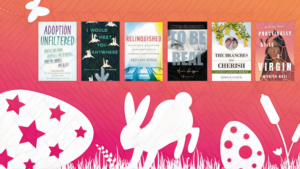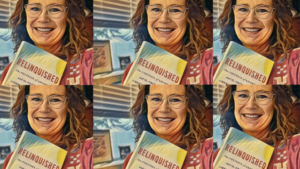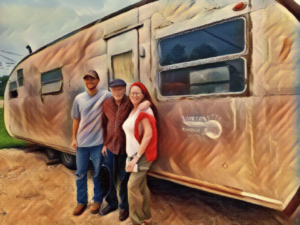This year’s conference is titled “Honoring the Past, Treasuring the Present, Shaping the Future,” so it seems fitting that I will present a session on memoir writing titled “The Power of Memoir to Heal Your Heart and Claim Your Story.” Memoir is a wonderful tool to honor the past and use the lessons learned from it to shape our future selves. I say “selves” because we are always changing.
We are not the same person we were at 6, 16, 36, or 66. It is all those selves that live inside us that we give voice to as we consider the memoir we would like to write. What did those selves not know then that you, the you who wants to write your book, wish they had? What did those past selves teach you along the way? What challenges did they overcome, or what great internal mysteries did they solve to make you exactly who you are now? That is memoir writing in a nutshell. Giving voice to all those past parts and examining how you got from point A to point B, hopefully in one piece.
WHAT’S IN STORE?
 This year’s conference keynote is Susan Ito, author of the memoir, “I Would Meet You Anywhere.” Susan will chart her 30-year journey of writing her memoir, how it shifted and changed over time, and share with participants a lens with which to reflect on their lifelong narratives.”
This year’s conference keynote is Susan Ito, author of the memoir, “I Would Meet You Anywhere.” Susan will chart her 30-year journey of writing her memoir, how it shifted and changed over time, and share with participants a lens with which to reflect on their lifelong narratives.”
My talk on the same topic follows Susan’s, where we will continue to explore memoir writing and examine how to take those first wobbly steps toward your first draft. Memoir writing and editing have consumed my life for the last 5 years. I am happy to report this adoptee’s memoir is complete, and I am now looking for representation. You can read an excerpt here. Still, while I am no expert on how to get a book published, I have certainly paid my dues when it comes to writing one.
For two of the last five years, I have worked with a professional editor and adoptive mom from Canada, who delivered both developmental and structural editing. I met her at a writing retreat she leads in Costa Rica. It was one of those synchronicity things. I got there, and my instructor was an adoptive mom. Gulp. This coming year will be my fourth time attending the retreat, where numerous other writers have helped critique and shape my work, as I have theirs.
I created this talk on where to begin with memoir because I realize today how much I didn’t know when I started my book. My lack of understanding of the basics led me to write a 120 thousand-word first draft, 40 thousand of which I had to cut. That is half a book! Thank God for a fantastic editor who took me under her wing and schooled me for more than two years and twice that many “final” drafts.
We will talk about why you should write a memoir if you are called to, and I’ll do my best to help dispel common fears associated with sharing your story. We will touch on the bones, how to pick the right stories to tell, how to outline a structure, and common mistakes to avoid. I will leave you with numerous resources, from writing groups to courses to recommended books and workshops.
One piece of advice I can share straight away is if you want to write a memoir, read the form. Memoirists are as different as their stories. Good memoirs follow some basic rules, which we will explore, but in short, reading other works will inspire you and teach you simultaneously. This will also help you see that there is no one right way. I suggest you check out “All You Can Ever Know” by Nicole Chung, and Mary Karr’s “Liars Club.” You can also find more constellation memoir recommendations in my resources section.
YOUR STORY MATTERS
Memoir is not just writing about what happened, it is making sense of what happened. When Julie, my editor, returned my first draft and asked me, “What makes your story special and why should anyone care?” my immediate thoughts were “I don’t know and I don’t know” … I got dejected, thinking “Yeah, who really cares?” and “My story isn’t that different from all those other thousands of adoptees’ stories out there. My story is not more important or special than theirs.” But your story does matter, and it can help raise our voices.
I meet many in the constellation who want to share their story but worry about what friends or family will think. In my opinion, there comes a time when we, especially adoptees and birth parents, must stop taking ownership of other people’s feelings and start looking after our own. When we show up authentically in the world, that means we open up to the possibility of authentic relationships.
I admit that if my mom and dad were alive, I probably wouldn’t have been able to write my book. Or I certainly wouldn’t have included some of the things in it. So sometimes you may feel “now” is not yet the time. But if you feel called to write, write, and don’t put it off. No one says you have to publish any time soon or at all.
Also, you don’t have to know how you feel, or what you think about your life before you start writing. Insights will find you as you let your story come out. Realizations you don’t expect to come up will. Even if you think you know how you feel about something, you will likely discover that your feelings or perspectives begin to shift or morph as you write.
SHAKING THE BONES OUT OF THE CLOSET
Many of you may have looked back on a lifetime of journal entries and blog posts and thought “I can use all this stuff,” and you can. You can use emails and blog posts, old letters, photos, and journal entries to inspire you. These are great vehicles to jog your memories or serve as fodder. The way to begin taking stock of what stories will go in your book is through a major brainstorming session. Take every meaningful moment that you believe needs to be in this book and create a list. A turning point list.
Think about an event. It can be a big event or a small event. Can be anything from the day you learn to tie your shoes to the day you were married. How old were you? What year was it? Where were you? Who were you with? Then create a timeline. Arrange all your stories into that timeline. Then take stock of each. What is important about this story? Why does it have to be included in this book?
The measure here is? If I remove this memory, will the book continue to make sense? Can you cut it and nothing is lost? If it’s just a nice to have, then it’s not central to moving your story along. These key scenes are the building blocks for your narrative arc.
Some of my key memories included:
Drive with Dad to pick cotton- Grandfather’s suicide and kicking brain matter off his stoop
- Being told my parents didn’t know my birthday or have my birth certificate
Thanksgiving with my aunt and my cousins- Selling my birthday cupcakes instead of eating them (upset that my surprise b-day party led me to wonder where my birth mother was).
- The day I learned at 18 that I was pregnant, and the connected memory of my cousin suggesting that I put my baby up for adoption.
Auditioning for the theater- The day I asked my mother to let a better mommy adopt me
The day Daddy wrecked the car
These were all great stories, but the difference is some had to be told. They were central to the story, while some were just sentimental memories. Nice to haves that had no role in moving the story along. The measure here is, could I remove this scene or chapter and have the book continue to make sense?
So with your must-have stories selected, what comes next?
FIND YOUR WHY
It is important as you begin to think about your memoir that you have a summary of why this story must be told, and some notion of why you want to write this book. You will need it for your book proposal, but it will also serve as a great guidepost to inspire your writing and keep your eye on the prize. Once I set fear aside, and put my why down on paper, a weight lifted, and I began to feel a sense of ownership over my story.
IN CLOSING
The beauty of writing memoirs is that our healing comes to us by owning our truth. And it also comes from sharing our story and having others say “Me too.” Or “It felt like you were talking to me.” If a single soul never reads my book, I am still glad I wrote it. In doing so, I truly came to terms with the past and gained a new understanding and relationship with myself. I hope you will join me on Nov. 3 for my talk, “The Power of Memoir to Heal Your Heart and Claim Your Story.”







